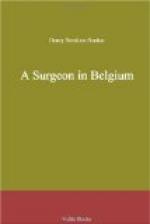At the very beginning of last century Napoleon visited Antwerp, and asserted that it was “little better than a heap of ruins.” He recognized its incomparable position as a port and as a fortress, and he determined to raise it to its former prosperity, and to make it the strongest fortress in Europe. He spent large sums of money upon it, and his refusal to part with Antwerp is said to have broken off the negotiations of Chatillon, and to have been the chief cause of his exile to St. Helena. Alas his enemies did not profit by his genius. We are the allies of his armies now, but we have lost Antwerp. Germany will be utterly and completely crushed before she parts with that incomparable prize. A mere glance at the map of Europe is sufficient to convince anyone that in a war between England and Germany it is a point of the first strategical importance. That our access to it should be hampered by the control of Holland over the Scheldt is one of the eccentricities of diplomacy which are unintelligible to the plain man. The blame for its loss must rest equally between Britain and Belgium, for Belgium, the richest country in Europe for her size, attempted to defend her greatest stronghold with obsolete guns; whilst we, who claim the mastery of the seas, sacrificed the greatest seaport in Europe to the arrangements of an obsolete diplomacy. If we are to retain our great position on the seas, Antwerp must be regained. She is the European outpost of Britain, and, as has so often been pointed out, the mouth of the Scheldt is opposite to the mouth of the Thames.
In Antwerp, as we saw her, it was almost impossible to realize the vicissitudes through which she had passed, or to remember that her present prosperity was of little more than fifty years’ growth. On all sides we were surrounded by wide boulevards, lined by magnificent houses and public buildings. There are few streets in Europe to eclipse the great Avenue des Arts, which, with its continuations, extends the whole length of the city from north to south. The theatres, the Central Station, the banks, would adorn any city, and the shops everywhere spoke of a wealth not restricted to the few. The wide streets, the trees, the roomy white houses, many of them great palaces, made a deep impression upon us after the darkness and dirt of London. Even in the poorer quarters there was plenty of light and air, and on no occasion did we find the slums which surround the wealthiest streets all over London. In the older parts of the city the streets were, of course, narrower; but even here one had the compensation of wonderful bits of architecture at unexpected corners, splendid relics of an illustrious past. They are only remnants, but they speak of a time when men worked for love rather than for wages, and when an artisan took a pride in the labour of his hands. If it had not been for the hand of the destroyer, what a marvellous city Antwerp would have been! One likes to think that the great creations of the past are not all lost, and that in the land to which the souls of the Masters have passed we may find still living the mighty thoughts to which their love gave birth. Are our cathedrals only stones and mortar, and are our paintings only dust and oil?




